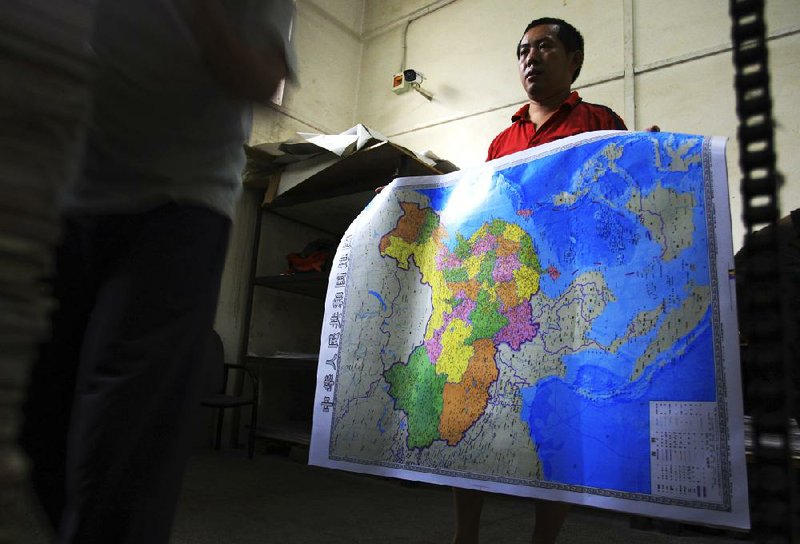Anna Le stepped out of the seafood restaurant, clutching a menu, and quickly phoned her fiance to tell him her choices for the traditional eight-course wedding banquet.
Lobster, oyster mushrooms, a bird's nest of crispy chow mein, crab and asparagus soup.
"Before you order," Eric Huynh responded quickly, "check the ownership."
On the streets of Little Saigon in Orange County, Calif., it has become important to ask about the nationality of shop owners, inspect products to see where they are made and rethink travel arrangements.
A territorial dispute in the South China Sea over a chain of islands, atolls and water-washed reefs is now touching everyday lives in immigrant communities like the Vietnamese-American district that spreads across the official city boundaries of Westminster and Garden Grove in Orange County.
For months, anger has grown among Vietnamese as China has become more assertive in its claim to the Paracel and Spratly islands, which offer rich fishing grounds for countries such as Vietnam and strategic outposts for countries such as China. Reports that China is building up a reef island large enough to accommodate an airfield have escalated tensions.
Vietnamese-American activists have organized demonstrations outside the Chinese Consulate in Los Angeles, marched in the streets of Little Saigon and raised funds to support the resistance efforts in Vietnam.
Even those who don't feel personally touched by what's happening overseas know it's critical not to be seen as being supportive of China.
"I don't have a strong opinion, but I don't want to offend any of my guests," Le said of her wedding plans. "When we live among expats, we always have to watch what's going on in our native countries. The news impacts our actions."
Thang Tran, the owner of ATNT Travel in Westminster, said he felt duty-bound to stop offering guided trips to China.
"As a Vietnamese, I cannot do business with a regime that has no good intentions toward Vietnam," he said. "Ultimately, there are plenty of places to see in this world."
The shared concern over the fate of the islands has united immigrants who most often are focused on fighting the Communist government that controls their homeland.
"China thinks it can just reach out and grab anything it wants," said Hoang Tran, a grandfather from Santa Ana who has joined protests in Little Saigon and Los Angeles.
"They are so powerful while Vietnam is so tiny -- we must speak up for our rights. What happens if they try to take other land?"
To some, the dispute in the South China Sea is a reminder of 1,000 years of Chinese rule, a period of great oppression when customs, religion and even day-to-day language were forced on the people who lived in what's now modern Vietnam.
The media in Vietnam and China have been riveted by the dispute over the Paracel Islands, known as Xisha in Chinese and Hoang Sa in Vietnamese. They are controlled by the People's Republic of China but also claimed by Taiwan and Vietnam. The archipelago includes nearly 130 small coral islands and reefs that are nearly midway between the coastlines of China and Vietnam.
The lesser known Spratly Islands -- Nansha in Chinese, Truong Sa in Vietnamese -- include nearly 750 reefs, islets, atolls, cays and islands. They have no inhabitants and little economic value but are important in marking global borders.
For years, the two countries have played a cat-and-mouse game over the islands. During the Vietnam War, China and Vietnam battled over the territory and since then the two countries have taken various steps claim it.
Jeffrey Wasserstrom, a University of California, Irvine, history professor, said China now appears to be returning to its earlier role of being the aggressor and dominant power in the region.
"When you're in Asia, this is the country you have to worry about the most," Wasserstrom said. "It seems to never be satisfied with the power it wields."
Thien Thanh Nguyen, a cameraman for Garden Grove-based Saigon Broadcasting Television Network, is one of those who feels energized by community activism. As a journalist, he has witnessed protests involving the islands, and as a citizen he has become a participant.
For months, he has led protesters to shopping malls, where they take merchandise to cash registers and then publicly -- and loudly -- identify the items made in China and refuse to buy.
"I want the people inside the country to always know that the younger generation here cares about them," Nguyen said.
Vietnamese-American activists say they wish they would get support from other Asian immigrants. But the passion of the Vietnamese for a distant dispute seems absent in places such as nearby Irvine, a heavily Asian community with a large Chinese-American population.
"I follow the news, but I'm not engaged in running up and down the street, yelling about this island or that island," said Wayne Wang, who was standing outside the Chinese Cultural Center in Irvine where his child is enrolled in language lessons.
"Our community has resettled here for a long, long time. We keep our culture but we don't get involved in how the country is managed," he said. "We leave what's happening in China in China."
SundayMonday on 12/28/2014
